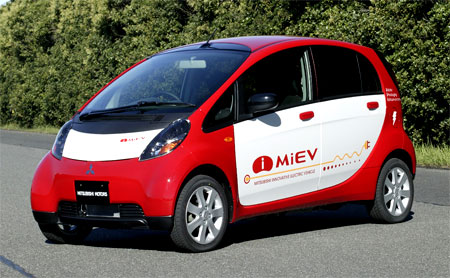
So if hybrid are a stopgap, could electric be the future? If it turn out to be, the automotive world would have turned full circle - at the tuen of the 20th century before cars went to mass market with the Ford Model T, electric vehicle (EV) did battle with gasoline propelled cars, with the former gaining the initial upper hand before being surpassed as development of the internal combustuin engine gathered pace.

Today,as Mother Nature'shealth is deteriorating, EVs haveonceagaiin come to prominenceas carmakers jostle to produce the ultimate green car. One such company is Mitsubishi, and when its iMIEV (Mitsubishi Innovative Electric Vehicle) plug-in eclectric car made arecent stop near my place, utook the chance for a spin in it.

The iMIEV is based on the i minicar, and in its cute kei-car, Mitsubishi has found the 'optimum packaging for an EV' or perfect fit with very little modification needed, in other words. This is due to the i's unique rear-engine layout with a slim fuel tank under the seats; the electric motor and inverter takes the place of the engine while the car's batteried replace the fuel tank. This convenient plug and play style drivetrain swap mean that there's no sacrifice in space - despite the kei-car footprint, the i's 2550mm wheel-base is identical to that of a Toyata Vios - or handling since the location of the batteried lower the car'scentre of gravity.

Unlike in hybrid cars such as the Toyota Priusand Honda Civic Hybrid that use nicked-metal hydride batteries, the i MIEV uses a lithium-ion oack co-developed with GS Yuasa, which is comparatively smaller, ligher and has higher energy density, as uses in most condumer electric products. The i MIEV's 220V battery oack, cinsisting of 22 modules, can be charged through any plug or through a quick charger system. Tapping from the national grid takes seven hours to fully replenish the battery (a normal charge should take less time as the battery would not be totally drained) while the quick-charge fills up 80% juice in half hour. Think of it like charging your mobile phone before you go to sleep. Mitsubishi quotes a range of 160lm for one full charge in 'ideal condiotion'; if 130km is a more realistic figure, it would still be good for a day of urban commuting.

A swift urban commuter it is, as the i MIEV's 63bhp permanent magnet synchronous electric motor produces 180Nm of torque, available from idel - that's nearly double what the standard 660cc turbo engine has and more torque than a Honda Civic 1.8, all from 0 rpm. The inevitable weight penalty, mainly from the batteries, is 180kg to make 1080kg, but this is redered irrelevant thanks to the big trust available. The i MiEV sprints to 100km/h in about 9 secs and has a top speed of 140km/h. All done in eerie silence and with 0 exhaust gases.
 It's all very impressive, and the i MiEV is no one-off prototype either;fleet tests with Japanese power companies have been ongoing since 2006 and the EV is slated for 1 2009 launch in Japan, so this is a car you can actually buy in the near future. Yes,the range is not grat, charging infrastructure needs tobe kick-started and government subsidies are vital to keep EVs affordable (i MiEV should be retail at double the price of petrol i in Japan, after subsidies), but by being entirely usable and superior to the current car in many areas, the i MiEV makes a strong case for an electric future in the car world.
It's all very impressive, and the i MiEV is no one-off prototype either;fleet tests with Japanese power companies have been ongoing since 2006 and the EV is slated for 1 2009 launch in Japan, so this is a car you can actually buy in the near future. Yes,the range is not grat, charging infrastructure needs tobe kick-started and government subsidies are vital to keep EVs affordable (i MiEV should be retail at double the price of petrol i in Japan, after subsidies), but by being entirely usable and superior to the current car in many areas, the i MiEV makes a strong case for an electric future in the car world.













No comments:
Post a Comment